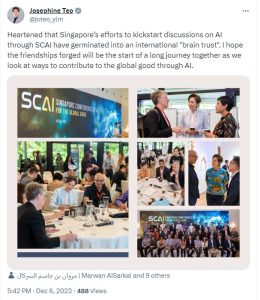Singapore launched its first AI strategy in 2019, aiming to deepen the use of AI in transforming the economy.
Singapore’s early investment in AI led to the creation of approximately 150 research teams and 900 startups focusing on AI development. Consequently, Singapore has experienced notable advancements in AI, leading to the creation of innovative products and improved capabilities in various industries.
Singapore contributed 15% of Nvidia’s quarterly revenue, which amounts to US$2.7 billion. The Singaporean government has unveiled the National AI Strategy 2.0 (NAIS2.0) to make Singapore a leader in the field of AI. This strategy focuses on nurturing talent, promoting the AI industry, and ensuring AI serves the public good through research and infrastructure.
ALSO READ:
According to a report by The Straits Times, Lawrence Wong, Singapore’s Deputy Prime Minister, said Singapore has to take a more systematic path to harness the benefits of AI for the public good while mitigating its impact on jobs and livelihoods, as well as other risks such as deepfakes, scams, cyberattacks and misinformation.
Wong said that the revised AI Strategy expands Singapore’s focus compared to the 2019 strategy. The previous strategy mainly focused on using AI in healthcare, security, and education.
“Recent breakthroughs in AI have sparked renewed interest about the potential of AI, its risks and implications to humanity… Discussions about AI’s potential benefits and threats are not new, but we are venturing into uncharted territory,” said Wong.
Singapore’s AI Strategy to include localized LLM
Singapore has also been keeping track of AI technology. It is a leader in technology in Southeast Asia and launched the world’s first Model AI Governance Framework in 2019.

Singapore launched AI Verify in 2022. It is an AI governance testing framework and software toolkit that was made available to developers in June 2023. AI Verify aligns with internationally recognized AI governance principles, guidelines, and frameworks, including those from the EU, OECD, and Singapore. It consists of 11 AI ethics principles with corresponding testable criteria and testing processes.
The Cybersecurity Agency of Singapore made several announcements to boost cybersecurity.
Singapore is leading the way in creating an AI model that can understand and create human language, taking into account the different cultures and languages of Southeast Asia. According to Singapore’s Infocomm Media Development Authority (IMDA), this language model could be used in the future for text-to-speech or text-to-image programs.
Singapore’s Deputy Prime Minister Lawrence Wong emphasized the need for a structured approach in harnessing the advantages of AI for the benefit of the public. To read more click here.
 InfoSecBulletin Cybersecurity for mankind
InfoSecBulletin Cybersecurity for mankind














